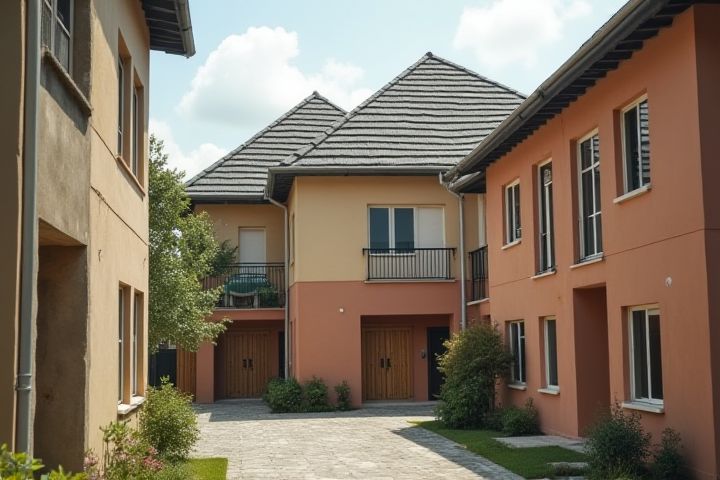
Housing in Nigeria encompasses a diverse range of structures, from sprawling urban estates in cities like Lagos and Abuja to rural compounds in less populated regions. The country faces significant challenges in the housing sector, including rapid population growth and a housing deficit exceeding 17 million units, which affects affordability and access. Traditional architectural styles often reflect cultural heritage, using locally sourced materials such as mud, thatch, and wood, while modern homes increasingly incorporate contemporary designs and amenities. Initiatives by both government and private developers aim to improve housing access and affordability, with a focus on affordable housing projects and low-cost building materials. Understanding the dynamics of Nigeria's housing market is crucial for investors, policymakers, and potential homeowners seeking to navigate the complexities of property ownership and development.
Rapid urbanization
Rapid urbanization in Nigeria has led to a significant increase in housing demand, particularly in major cities like Lagos and Abuja. As urban migration accelerates, the necessity for affordable and sustainable housing solutions becomes critical to accommodate the growing population. Government initiatives and private investments are focusing on the development of mixed-use communities that integrate residential, commercial, and recreational spaces. Amid these changes, you may find opportunities in real estate ventures aimed at improving living conditions and addressing the housing deficit.
Affordable housing shortage
Nigeria faces a significant affordable housing shortage, with an estimated gap of over 17 million units. Factors contributing to this crisis include rapid urbanization, population growth, and insufficient investment in low-cost housing solutions. Various government initiatives and private sector partnerships are emerging to address these challenges, promoting innovative construction methods and financing options. Understanding the housing market dynamics can empower you to make informed decisions in navigating the real estate landscape.
Informal settlements prevalent
Informal settlements in Nigeria, often characterized by unplanned and overcrowded living conditions, account for a significant portion of urban housing. These areas arise from rapid urbanization and a lack of affordable housing options, leading to challenges such as inadequate infrastructure and limited access to essential services. Many residents in these settlements often engage in self-help construction methods, resulting in diverse architectural styles reflective of local culture. Addressing the housing deficit in Nigeria requires targeted policies that promote sustainable development and improve living conditions in these informal communities.
Rising real estate demand
Rising real estate demand in Nigeria is driven by rapid urbanization, with the population increasingly migrating to urban centers in search of jobs and improved living standards. The housing market has seen significant investment from local and international developers, aiming to provide affordable and quality housing solutions to meet the growing needs of young professionals and families. Government initiatives to enhance infrastructure and encourage public-private partnerships further stimulate the sector, promoting sustainable housing development. You can explore various options, from luxury apartments to budget-friendly homes, reflecting the diverse needs of Nigeria's evolving population.
Government housing initiatives
Government housing initiatives in Nigeria aim to address the country's acute housing deficit, which is estimated to be over 20 million units. Programs such as the National Housing Policy and the Housing for All initiative emphasize affordable housing development, prioritizing low-income earners. Through public-private partnerships, the government seeks to enhance infrastructure, promote sustainable building practices, and streamline access to mortgage financing. Your involvement in these initiatives can help drive community participation and ensure that housing solutions meet the unique needs of diverse populations.
Diverse architectural styles
Housing in Nigeria showcases a rich tapestry of diverse architectural styles influenced by various ethnic groups and regional climates. Traditional structures, such as the mud houses in northern Nigeria and the stilt homes in the Niger Delta, reflect indigenous building techniques and materials. Modern architecture in urban areas features contemporary designs that incorporate both local aesthetics and international trends, promoting sustainability and functionality. Understanding these architectural variations can enhance your appreciation of Nigeria's cultural heritage and its evolving urban landscape.
Land ownership complexities
Land ownership in Nigeria is characterized by a dual legal system that includes customary and statutory laws, leading to complexities in housing development. Traditional land tenure systems often coexist with modern property laws, resulting in disputes over land rights and ownership verification. Urbanization drives demand for housing, but the lack of a comprehensive land registration system exacerbates conflicts and hinders mortgage access. As you navigate the housing market in Nigeria, understanding these land ownership intricacies is essential for making informed real estate decisions.
Mortgage financing challenges
Housing in Nigeria faces significant challenges primarily due to limited mortgage financing options. The high-interest rates associated with loans make homeownership unattainable for many, leading to a substantial housing deficit. Government policies often fail to provide adequate support, resulting in a lack of investment in affordable housing projects. As a prospective homeowner, you may encounter difficulties navigating these financial constraints while seeking suitable housing solutions.
Construction material costs
In Nigeria, housing construction costs are significantly influenced by the prices of materials such as cement, steel, and timber. As these essential components fluctuate due to local demand and global supply chain issues, the overall affordability of housing projects is affected. You may find that the rising costs of imported materials, combined with limited local production capabilities, complicate budget planning for developers and homeowners alike. To navigate these challenges, many are exploring alternative materials and innovative construction techniques to reduce expenses and improve sustainability.
Emerging smart cities
Emerging smart cities in Nigeria are transforming housing landscapes by integrating technology to enhance urban living. These cities prioritize sustainability, incorporating renewable energy sources and efficient waste management systems to reduce environmental impact. Advanced infrastructure, such as smart grids and high-speed internet, facilitates seamless connectivity and improved public services for residents. As a result, you can expect more efficient transportation, safer neighborhoods, and enhanced quality of life in these innovative urban developments.
